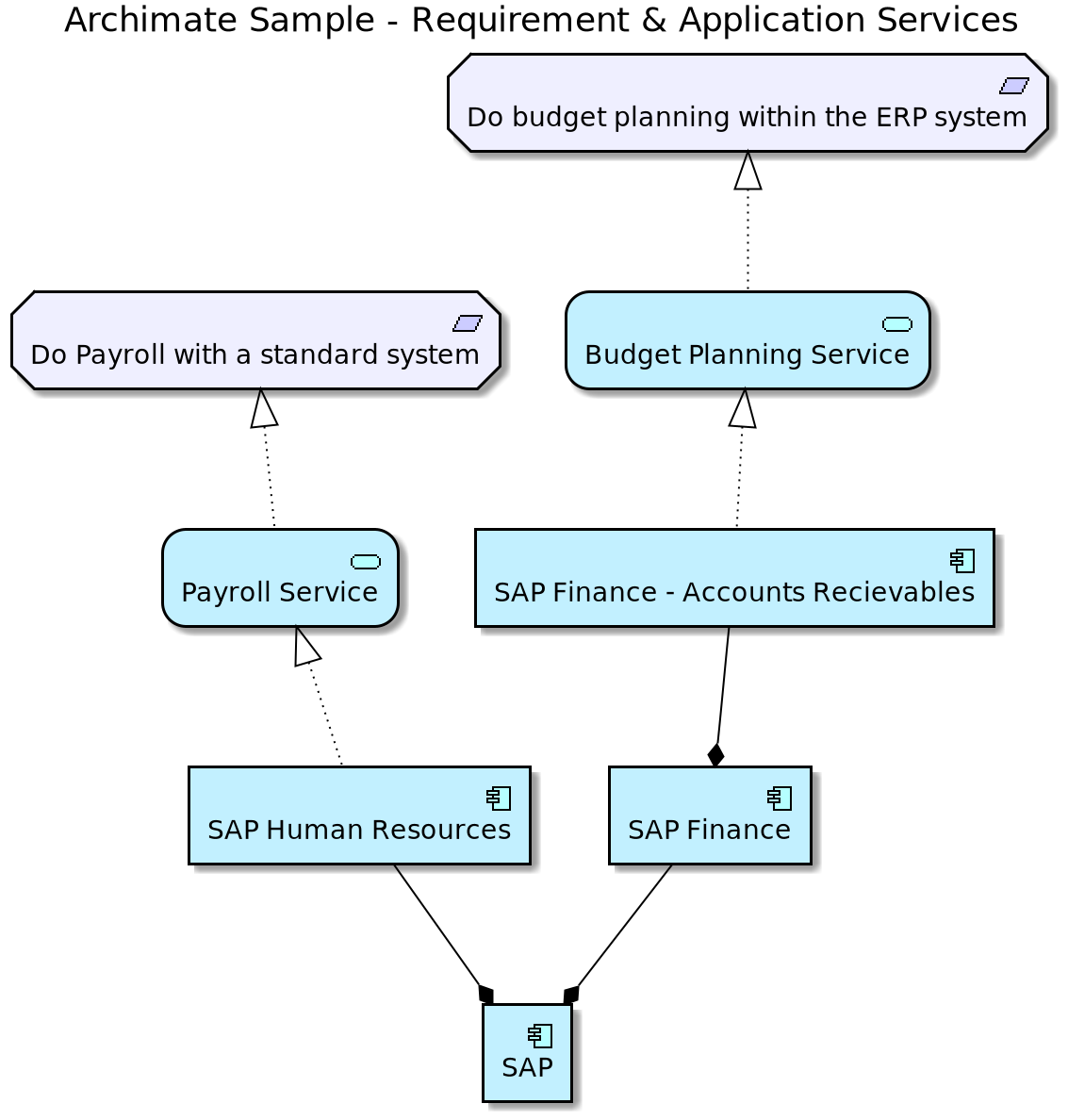PlantUML macros and other includes for creating Archimate Diagrams easily.
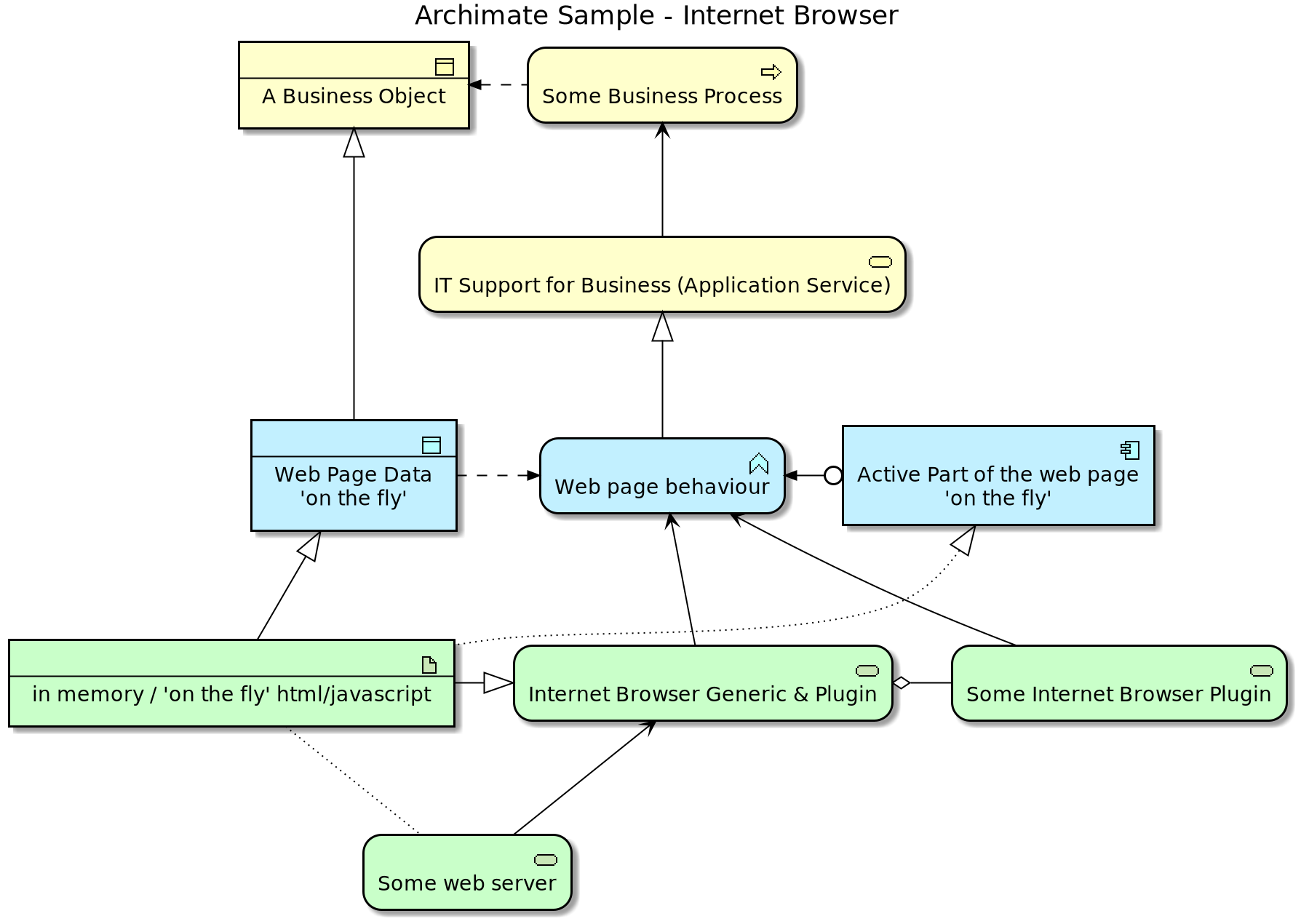
PlantUML is an open source project that allows you to create UML diagrams. Diagrams are defined using a simple and intuitive plain text language. It uses Graphviz software to lay out its diagrams. Images can be generated in PNG, in SVG or in LaTeX format.
ArchiMate is an open and independent enterprise architecture modeling language to support the description, analysis and visualization of architecture within and across business domains in an unambiguous way.
ArchiMate offers a common language for describing the construction and operation of business processes, organizational structures, information flows, IT systems, and technical infrastructure. This is just like an architectural drawing in classical building where the architecture describes the various aspects of the construction and use of a building. This insight helps the different stakeholders to design, assess, and communicate the consequences of decisions and changes within and between these business domains.
Archimate-PlanUML combines the benefits of PlantUML and ArchiMate for providing a simple way of creating and managing ArchiMate diagrams. The Archimate-PlantUML is a set of macros and other includes written on top of PlantUML Archimate specification, with an aim to simplify the syntax for creating elements and defining relationships.
Include the Archimate.puml file to the top of your ArchiMate PlantUML .puml or .wsd file. This will allow you to use all the macros that are defined in the Archimate.puml file.
To always use the most updated version from this repo, add the following inlcude statement
!includeurl https://raw.githubusercontent.com/ebbypeter/Archimate-PlantUML/master/Archimate.pumlHowever, if you want offline capability and be independent of any internet connectivity, you can also download the files found in the root of this repository and referece in locally with
!include path/to/Archimate.pumlAfter you have included Archimate.puml you can use the defined macros for ArchiMate elements.
The ArchiMate elements are defined in the following pattern:
Category_ElementName(nameOfTheElement, "description")For example:
- To define a
Stakeholderelement, which is part ofMotivationcategory, the synax will beOutput:Motivation_Stakeholder(StakeholderElement, "Stakeholder Description")

- To define a
Business Serviceelement,Output:Business_Service(BService, "Business Service")
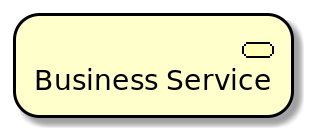
The ArchiMate relationships are defined with the following pattern:
Rel_RelationType(fromElement, toElement, "description")and to define the direction / orientation of the two elements:
Rel_RelationType_Direction(fromElement, toElement, "description")The RelationTypes supported are:
- Access
- Aggregation
- Assignment
- Association
- Composition
- Flow
- Influence
- Realization
- Serving
- Specialization
- Triggering
The Directions supported are:
- Up
- Down
- Left
- Right
For example:
- To denote a
compositionrelationship between the Stakeholder and Business Service defined above, the syntax will beOutput:Rel_Composition(StakeholderElement, BService, "Description for the relationship")
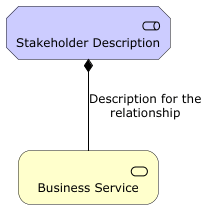
- To orient the two elements in top - down position, the syntax will be
Output:
Rel_Composition_Down(StakeholderElement, BService, "Description for the relationship")
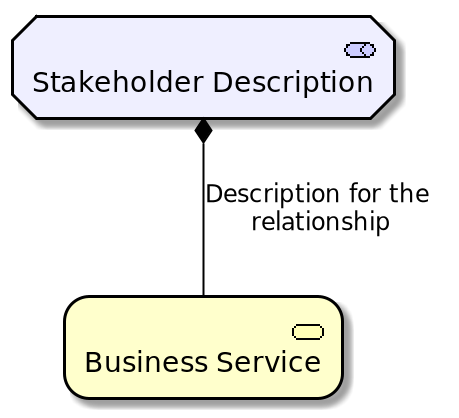
Groups in ArchiMate are denoted using the following syntax:
Grouping(nameOfTheGroup, "Group Description"){
//Define the ArchiMate Elements
}and to define the direction / orientation of the two elements:
Group(nameOfTheGroup, "Group Description"){
//Define the ArchiMate Elements
}For example
-
Group Type 1:
Grouping(Example01, "Group Type 01"){ Motivation_Stakeholder(StakeholderElement, "Stakeholder Description") Business_Service(BService, "Business Service") }
-
Group Type 2:
Group(Example01, "Group Type 01"){ Motivation_Stakeholder(StakeholderElement, "Stakeholder Description") Business_Service(BService, "Business Service") }
@startuml
!includeurl https://raw.githubusercontent.com/ebbypeter/Archimate-PlantUML/master/Archimate.puml
title Archimate Sample - Requirement & Application Services
'Elements'
Motivation_Requirement(ReqPayrollStandard, "Do Payroll with a standard system")
Motivation_Requirement(ReqBudgetPlanning, "Do budget planning within the ERP system")
Application_Service(ASPayroll,"Payroll Service")
Application_Service(ASBudgetPlanning,"Budget Planning Service")
Application_Component(ACSAPFinanceAccRec, "SAP Finance - Accounts Recievables")
Application_Component(ACSAPHR, "SAP Human Resources")
Application_Component(ACSAPFin, "SAP Finance")
Application_Component(ACSAP,"SAP")
'Relationships'
Rel_Realization_Up(ASPayroll, ReqPayrollStandard)
Rel_Realization_Up(ASBudgetPlanning, ReqBudgetPlanning)
Rel_Realization_Up(ACSAPFinanceAccRec, ASBudgetPlanning)
Rel_Realization_Up(ACSAPHR, ASPayroll)
Rel_Composition_Up(ACSAPFin, ACSAPFinanceAccRec)
Rel_Composition_Up(ACSAP, ACSAPHR)
Rel_Composition_Up(ACSAP, ACSAPFin)
@endumlIf you have any ideas, just open an issue and tell me what you think.
If you'd like to contribute, please fork the repository and use a feature branch.
Pull requests are warmly welcome.
This project is licensed under the MIT License - see the LICENSE.md file for details
- PlantUML Reference Guide - PlantUML Reference Guide
- Archimate 3.1 Specification - Archimate Specifications
- Plant UML Archimate Specifications - for archimate spec in PlantUML
- C4-PlantUML - for inspiration, base structure and scripts idea


